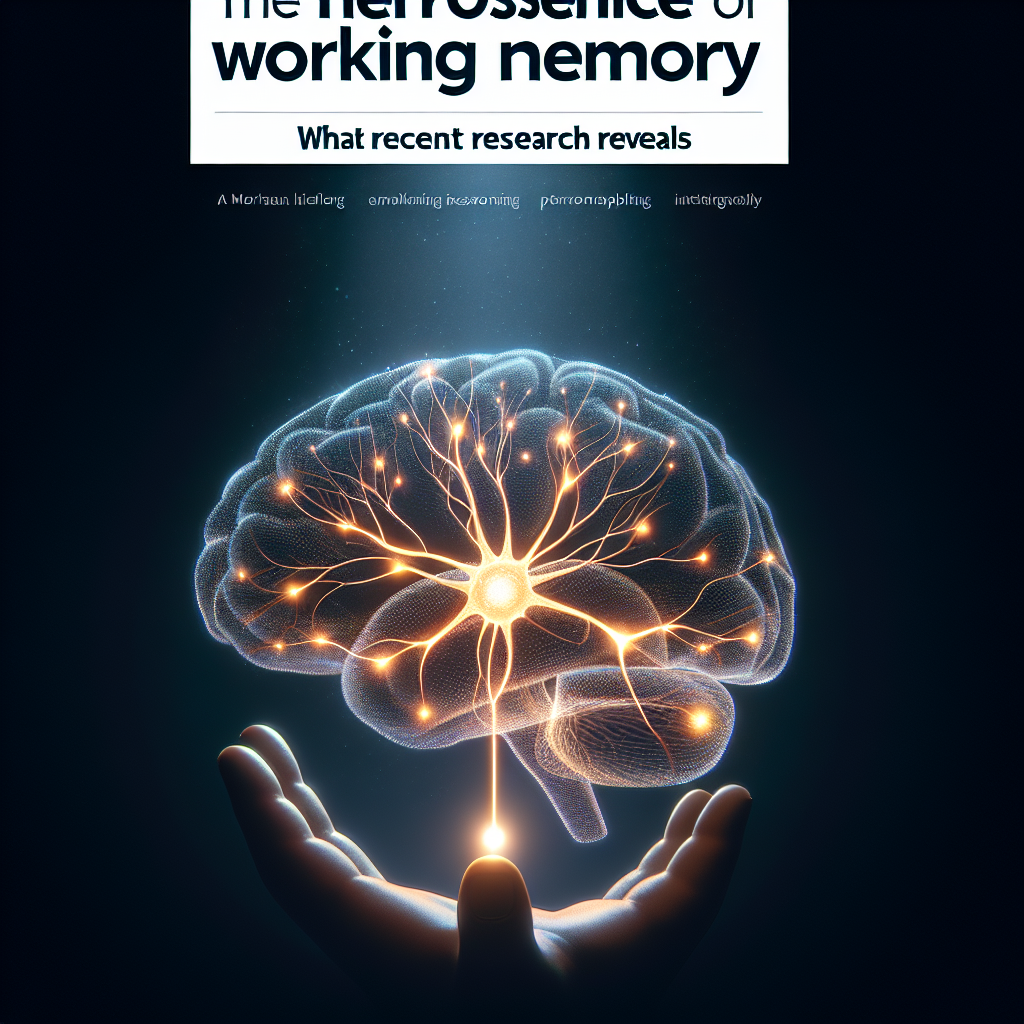
Introduction
In a world filled with distractions, maintaining focus and effectively using our cognitive resources has never been more critical. Understanding the neuroscience of working memory can unlock tremendous potential in both our personal and professional lives. Recent research has shed light on the intricate processes that underpin working memory, illustrating not only its importance but also its dynamic nature. This article will explore the neuroscience of working memory: what recent research reveals, providing you with compelling insights that could enhance your cognitive performance.
What Is Working Memory?
Defining Working Memory
Working memory is often referred to as our "mental workspace." It’s the system that allows us to hold information temporarily while we manipulate it. Think of it as a chalkboard in your brain where you can quickly jot down notes, ideas, and calculations that you need to keep in mind for a brief period.
The Components of Working Memory
According to Baddeley’s model, working memory consists of three key components:
- The Phonological Loop: Handles auditory information and language.
- The Visuospatial Sketchpad: Manages visual and spatial information.
- The Central Executive: Acts as a manager, coordinating activities between the phonological loop and the visuospatial sketchpad.
The Neuroscience Behind Working Memory
Brain Structures Involved
The prefrontal cortex (PFC) is primarily seen as the hub for working memory. This region also connects with other brain areas, such as the parietal cortex, which handles attention and spatial awareness. Studies utilizing functional neuroimaging have demonstrated that activity in these regions correlates with performance on working memory tasks.
Neurotransmitters’ Role
Recently, there has been increasing interest in neurotransmitters, such as dopamine, in relation to working memory. Research has shown that dopamine levels can influence working memory capacity. A balance in neurotransmitter levels appears crucial, as too little or too much dopamine can impair cognitive functions.
Recent Findings in Working Memory Research
Case Study 1: Aging and Working Memory
A recent study published in Nature Neuroscience explored how aging affects working memory. Researchers found that older adults often show a decline in working memory capacity, particularly in the central executive system. However, those who engage in regular cognitive training exhibited significant improvements.
Relevance: This study illustrates that while aging does impact our cognitive abilities, interventions can yield positive outcomes, emphasizing the neuroplasticity of the adult brain.
Case Study 2: Working Memory and Academic Achievement
Another pivotal research paper from Psychological Science indicated a strong correlation between working memory capacity and academic performance in children. Children with higher working memory capacity performed better in mathematics and reading comprehension tasks.
Analysis: This suggests that enhancing working memory might serve as a pathway to improve educational outcomes, potentially altering teaching methodologies for greater effectiveness.
Strategies to Enhance Working Memory
Cognitive Training Programs
Recent research has shown that specific training programs can enhance working memory capacity. These programs often combine various tasks designed to strengthen the three components of working memory. A study from Cognitive Training and Memory indicates that regular participants in cognitive training displayed measurable improvements in their working memory.
Physical Exercise
Engaging in regular physical exercise has been strongly linked to cognitive enhancement. Exercise increases blood flow to the brain, promotes neurogenesis, and can lead to improved working memory. According to the Journal of Neuroscience Research, aerobic exercise had a positive impact on working memory performance.
Table 1: Benefits of Physical Exercise on Cognitive Function
| Study | Findings |
|---|---|
| Journal of Neuroscience Research | Aerobic exercise improves working memory performance. |
| Cognitive Aging Research | Older adults showed enhanced memory after a 6-month exercise program. |
The Interplay Between Working Memory and Emotional Regulation
Emotional Factors
Working memory is not just about storage and recall; emotional factors significantly influence its function. A study highlighted in Frontiers in Human Neuroscience explored how stress and anxiety could hinder working memory performance.
Case Study 3: This study involved participants subjected to stressful situations. Those who practiced mindfulness techniques exhibited better working memory performance compared to those who did not.
Relevance: This indicates that emotional and cognitive processes are deeply intertwined, and strategies focusing on emotional regulation can serve to improve working memory.
Conclusion
In summary, the neuroscience of working memory: what recent research reveals presents exciting insights into the cognitive processes that govern how we think, learn, and function daily. Understanding these mechanisms empowers us to enhance our working memory through various strategies, including cognitive training programs, physical exercise, and emotional regulation techniques. By applying this knowledge, we can not only enhance our cognitive capabilities but also improve our overall quality of life.
FAQs
1. What is the difference between working memory and short-term memory?
While often used interchangeably, working memory is more complex. It allows for the manipulation of information, while short-term memory simply retains information temporarily without processing.
2. How can I improve my working memory?
Engaging in cognitive training, incorporating physical exercise, and practicing mindfulness techniques can significantly enhance working memory.
3. Is working memory capacity fixed?
No, recent studies indicate that working memory is flexible and can improve with targeted training and lifestyle changes.
4. What age does working memory peak?
Research suggests that working memory capacity typically peaks in early adulthood and may decline with age. However, cognitive training can mitigate these effects.
5. Can diet affect working memory?
Absolutely. Diet plays a crucial role in brain health. Nutrients like Omega-3 fatty acids, antioxidants, and vitamins C and E support cognitive function.
By understanding the neuroscience of working memory: what recent research reveals, you are empowered to enhance your mental performance in a world that demands more than ever from our cognitive resources. Continue exploring, training, and applying these insights for a brighter and sharper future!











